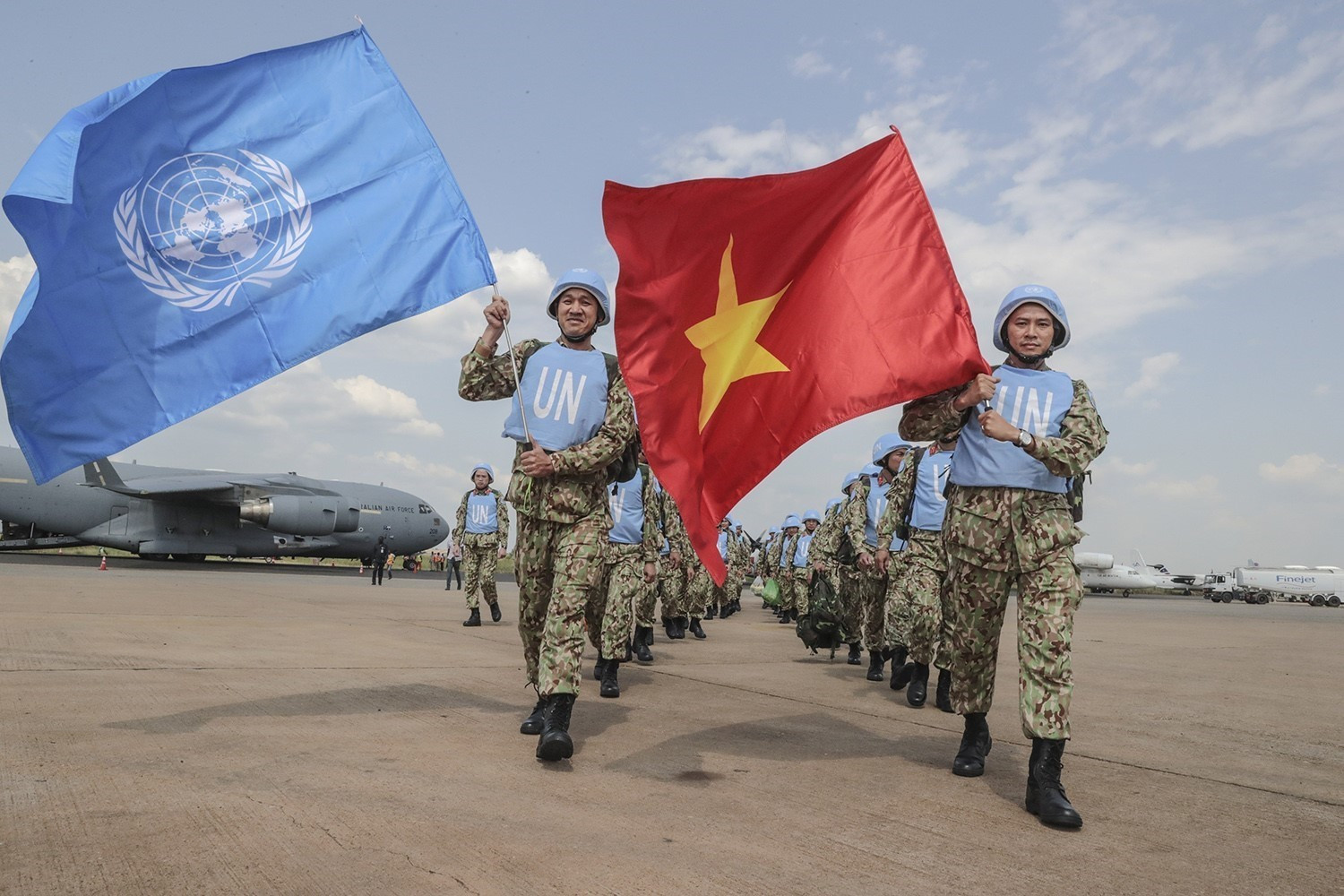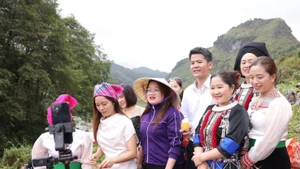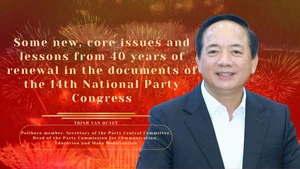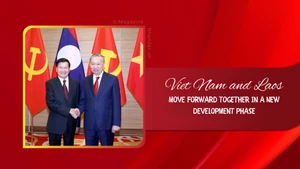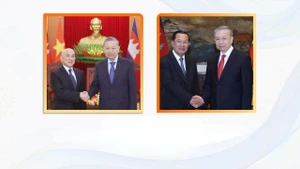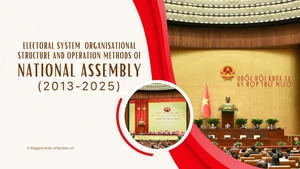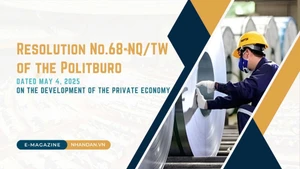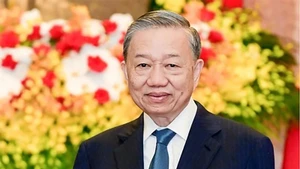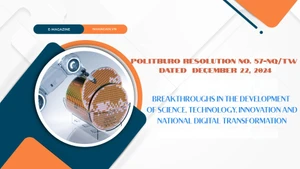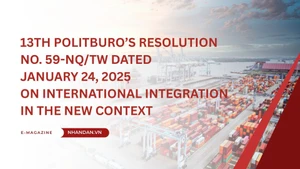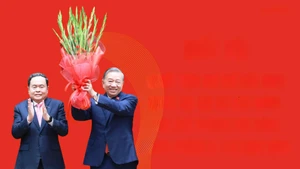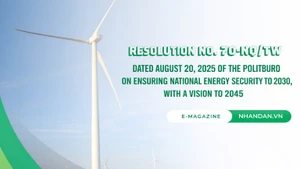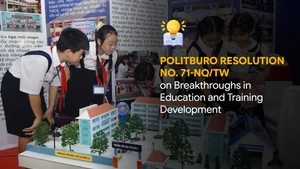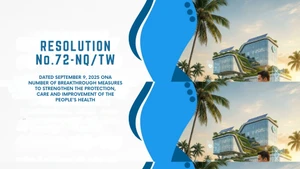Vietnam-United Nations: Development paths
September 20, 1977, marked the milestone of Vietnam officially joining the UN. Immediately after joining the UN, Vietnam took advantage of the sympathy and support from member countries so that the 32nd United Nations General Assembly (1977) passed Resolution 32/2 calling on countries and international organisations to provide aid and help Vietnam recover after the war. At the same time, Vietnam also took advantage of the UN’s assistance on capital, intelligence, and techniques to serve the country's socio-economic development.
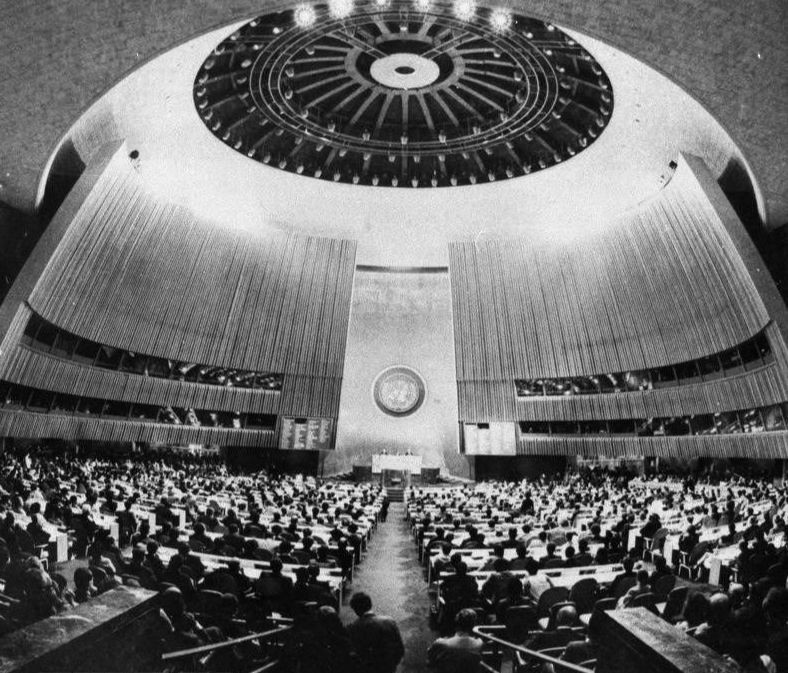 |
| On September 20, 1977, the opening session of the 32nd United Nations General Assembly in New York passed a Resolution recognising Vietnam as a member of the UN. (File photo: VNA) |
During the period when Vietnam had to deal with the severe consequences of the war while reorganising the poor and backward economy and gradually restoring production, the UN actively helped Vietnam solve the multifaceted difficulties with total aid reaching more than 500 million USD and gave significant support for social development items towards improving technological levels, promoting scientific and technical progress in Vietnam, restoring and building new production facilities, and enhancing development capacity. At the same time, in the context of the embargo, the cooperation with the UN created favourable conditions for Vietnam to access aid from many Western countries.
During the Doi Moi (Renewal) cause (1986-2011), the UN cooperation projects were a significant assistance source for Vietnam in building development policies and improving the management capacity of agencies and staff qualifications in the process of promoting renewal policies. The UN also continued to make valuable contributions to improving production techniques, developing scientific and technical human resources, and solving other social problems in Vietnam.
During the 2001-2005 cooperation period, at the request of the Government of Vietnam, the UN strongly shifted its technical assistance to supporting reform measures in economic policies and institutions, state-owned enterprises, public administration, law, public investment planning, banking system development, and expansion into other fields such as the prevention and control of HIV/AIDS and other serious diseases, supporting the implementation of grassroots democracy regulations, realising equal rights for men and women, and organising the annual Donor Advisory Group Conference.
The main priorities during this period were promoting reform; consulting in the development of new or amending many important laws; eliminating hunger and reducing poverty; supporting the implementation of Programme No.135 and integrating it with the implementation of other Millennium Development Goals (MDGs); supporting efforts to protect nature, raise people's awareness of the environment; developing strategies and policies; and improving natural resource management capacity, environmental management, and biodiversity.
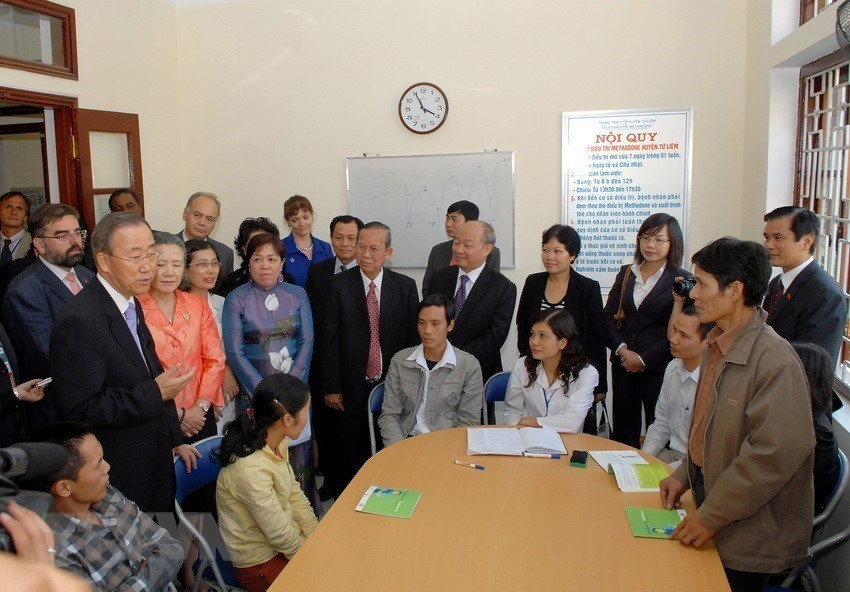 |
| United Nations Secretary General Ban Ki-moon visited the HIV Care, Protection and Prevention project at Tu Liem District Medical Centre, Hanoi, on the afternoon of October 29, 2010. (Photo: VNA) |
During the 2007-2011 period, implementing a foreign policy of multilateralisation and diversification, Vietnam strongly strengthened relations with the United Nations and international organisations. The most outstanding activity during this period is that Vietnam successfully completed its mission as a non-permanent member of the United Nations Security Council for the 2008-2009 term, marking the first time Vietnam participated in the United Nations’ most important body.
In addition, Vietnam has also participated in United Nations policy-making mechanisms such as: Vice President of the United Nations General Assembly in 1997, member of the Executive Council of UNDP/UNFPA (2000-2002 term), and member of the Economic and Social Council (ECOSOC) (1998-2000).
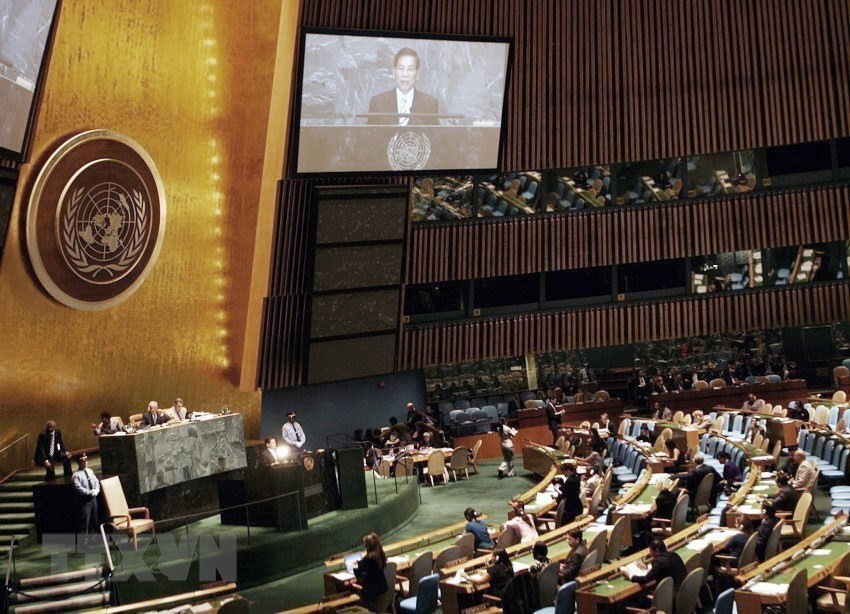 |
| On September 25, 2009, at the United Nations headquarters in New York (the US), President Nguyen Minh Triet spoke at the 64th Session of the United Nations General Assembly with the theme “Non-proliferation of nuclear weapons and nuclear disarmament”. (Photo: VNA) |
Vietnam actively negotiated and became an official member of the Chemical Weapons Convention (CWC) in 1998, participated in negotiations and was one of the first countries to sign the Comprehensive Nuclear-Test-Ban Treaty (CTBT) in 1996, and became a member of the Conference on Disarmament (CD) in 1996.
In addition, Vietnam also soon participated in the preparation process for major conferences such as the NPT Review Conference in 2000, 2005, and 2010; and a conferences on combating illicit trade in small arms and light weapons in 2001, 2003, etc.
During this period, Vietnam actively coordinated with United Nations development organisations to pilot the “One United Nations” initiative, which was highly appreciated by the donor community. Within the framework of the United Nations “Delivering as One” (DaO) Initiative, the Government of Vietnam and the United Nations actively coordinated to implement the United Nations One Plan for the 2012-2016 period in accordance with the five-year Socio-Economic Development Plan (SEDP) and the Socio-Economic Development Strategy (SEDS) of Vietnam.
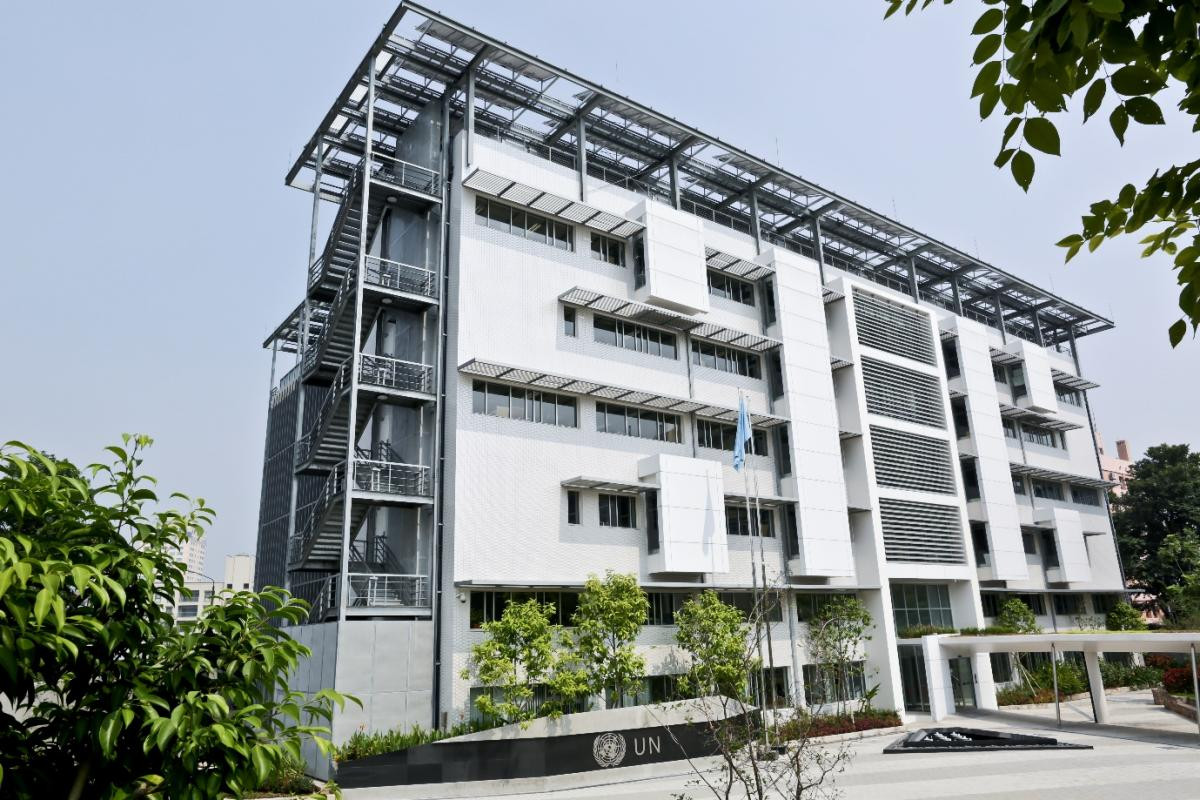 |
| The Green One United Nations House in Vietnam is an energy efficient and environmentally friendly building. (Photo: United Nations in Vietnam) |
An important component of the “One United Nations” initiative is One UN Home, concretized by the construction of the Green One United Nations House in Hanoi. Inaugurated on the occasion of UN Secretary General Ban Ki-Moon's visit to Vietnam in May 2015, it is the first green UN building in the world.
Vietnam is one of eight pilot countries implementing the “One UN Initiative” in the world. This initiative has contributed to improving operational efficiency and strengthening system cohesion of UN organisations in Vietnam.
In addition, Vietnam has also successfully fulfilled its role as a UNHRC member for the 2014-2016 tenure and a member of the ECOSOC in the 2016-2018 tenure. Vietnam has been sending personnel to participate in United Nations peacekeeping missions since 2014.
From the 2017-2021 period to now, the two sides have completed the Joint One Strategic Plan (OSP) for the 2017-2021 period between the Government of Vietnam and 18 UN agencies within the framework of the “One UN Initiative” signed in July 2017.
The OSP for the 2017-2021 period helped the Government of Vietnam implements the Socio-Economic Development Plan for the period 2016-2020 and the Sustainable Development Goals (SDGs).
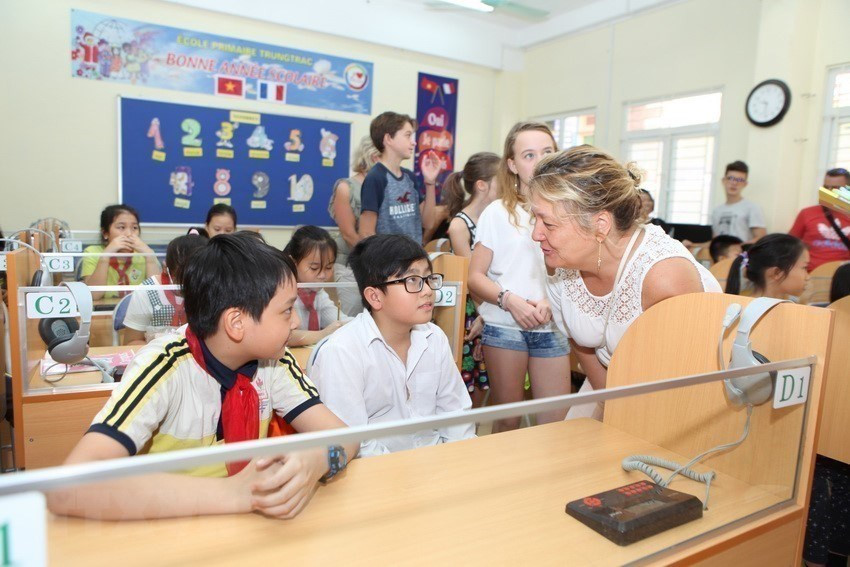 |
| In 2015, reviewing 15 years of implementing the UN Millennium Development Goals (MDGs), Vietnam early completed three of eight goals important goals: Eradicate extreme poverty and hunger (MDG1); Achieve universal primary education (MDG2); and Promote gender equality and empower women (MDG3). (Photo: VNA) |
Vietnam and the UN have approved the Strategic Cooperation Framework for 2022-2026. The United Nations Development Programme (UNDP), United Nations Population Fund (UNFPA), and the United Nations Children’s Fund (UNICEF) have also approved the Country Programme Document for Vietnam for the 2022-2026 period.
At the 26th UN Climate Change Conference of the Parties (COP26), Vietnam participated and promoted important multilateral initiatives, especially with Prime Minister Pham Minh Chinh having made a commitment to bring net emissions to zero by 2050, joined the pledge to reduce global methane emissions in 2030 compared to 2010, joined the Glasgow leaders’ declaration on forests and land use, and joined the Global Coal to Clean Power Transition Statement.
Vietnam has also actively coordinated well with the UN in the fight against the COVID-19 pandemic. Vietnam’s initiative with a resolution proclaiming December 27 as the International Day of Epidemic Preparedness has been approved by the UN General Assembly.
During the COVID-19 pandemic, Vietnam received more than 61.7 million doses of vaccine through the COVAX Facility and medical supplies worth 45 million USD from UN organisations. Vietnam contributed 50,000 USD to the UN COVID-19 Response and Recovery Fund and one million USD to COVAX. The country also became a patient reception and treatment point under the UN medical evacuation mechanism.
Amidst the Russia-Ukraine conflict, Vietnam has donated 500,000 USD to humanitarian relief activities to support people affected by the war in Ukraine.
Enhancing Vietnam’s role, voice and imprint
The Vietnam-UN cooperative relationship for more than 40 years has contributed to protecting and promoting national interests, especially in maintaining and strengthening a peaceful, secure and favourable environment for national development; promoting deeper international integration and contributing to the enhancement of Vietnam’s position and image in the international arena; deepening Vietnam’s relations with other countries, key partners and friends; and taking advantage of important resources to serve the country’s development.
After nearly half a century as a member of the UN, Vietnam continues to actively participate in the UN’s common efforts to resolve regional and international peace and security issues, and promote human rights.
Vietnam was actively engaged in the negotiations of and signed the 2018 Treaty on the Prohibition of Nuclear Weapons and was the tenth country to ratify the treaty.
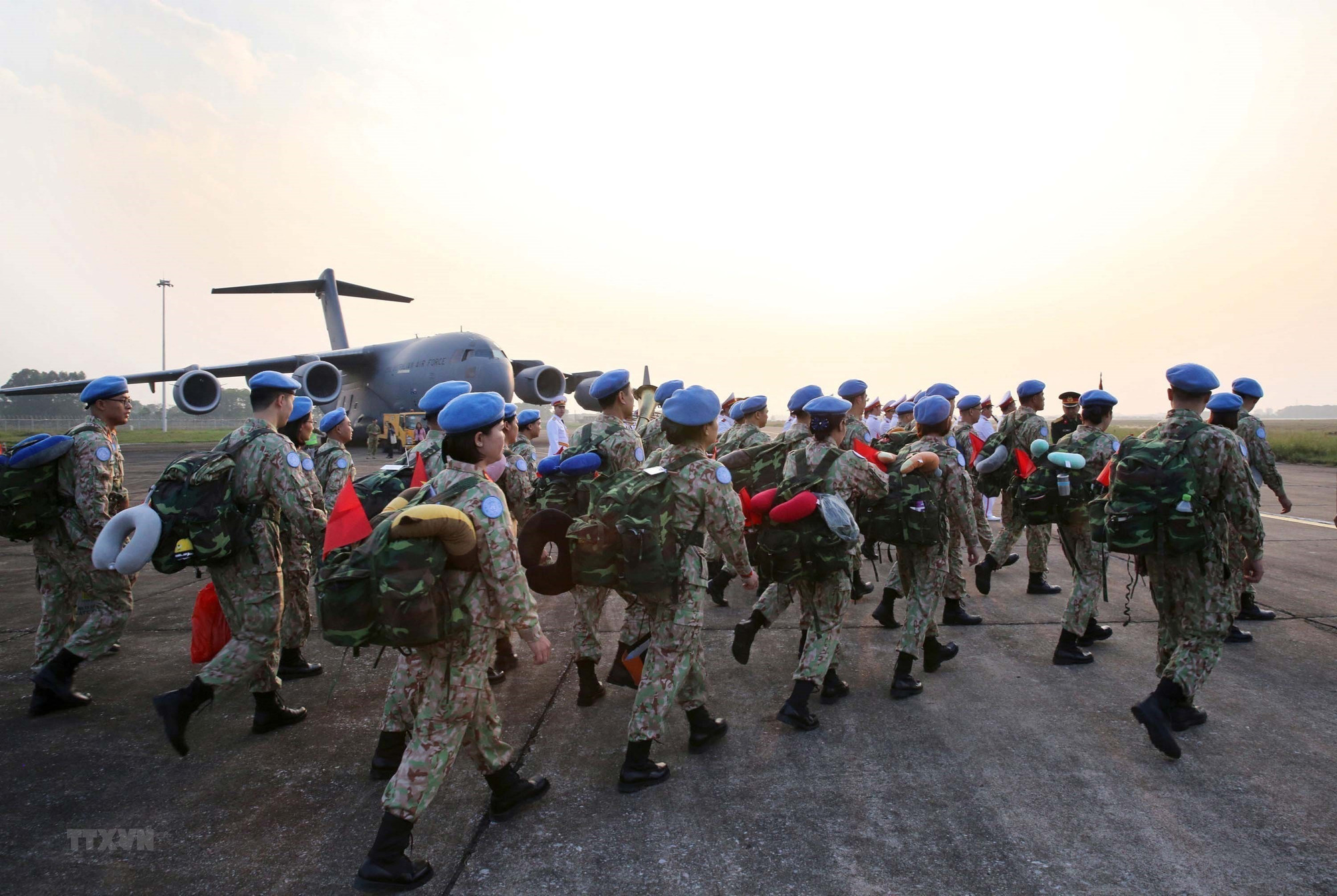 |
| Officials and staff of Level-2 Field Hospital No. 2 set off for the South Sudan mission. (Photo: VNA) |
In UN peacekeeping operations, Vietnam has dispatched 493 military officers to work at the UN peacekeeping missions in South Sudan, the Central African Republic, and the Department of Peace Operations at the UN headquarters; and deployed four Field Hospitals No. 2 at the mission in South Sudan and one engineering unit at the mission in Abyei (the area of dispute between South Sudan and Sudan). Vietnam is one of the countries with the highest female participation rate among countries sending peacekeepers.
On the other hand, Vietnam has made increasingly substantive contributions to the UN, including upholding the UN’s role and multilateralism, promoting respect for the UN Charter, international law, equal relations, development cooperation between countries and the nations’ right to self-determination, opposing acts of oppression, invasion and unilateral embargo in international relations; participating in the discussion and adoption of many important UN resolutions and declarations on development cooperation, disarmament, non-proliferation of weapons of mass destruction, anti-terrorism, and human rights protection.
Vietnam is hailed by the UN and the international community as a successful example in implementing the Millennium Development Goals and a country that is determined and committed to realising the 2030 Agenda for Sustainable Development as well as the Paris Agreement on climate change.
Vietnam has also been active in promoting initiatives to reform the UN, and is considered as one of the leading countries in implementing the “Delivering as One” initiative to increase the effectiveness of UN operations at the national level.
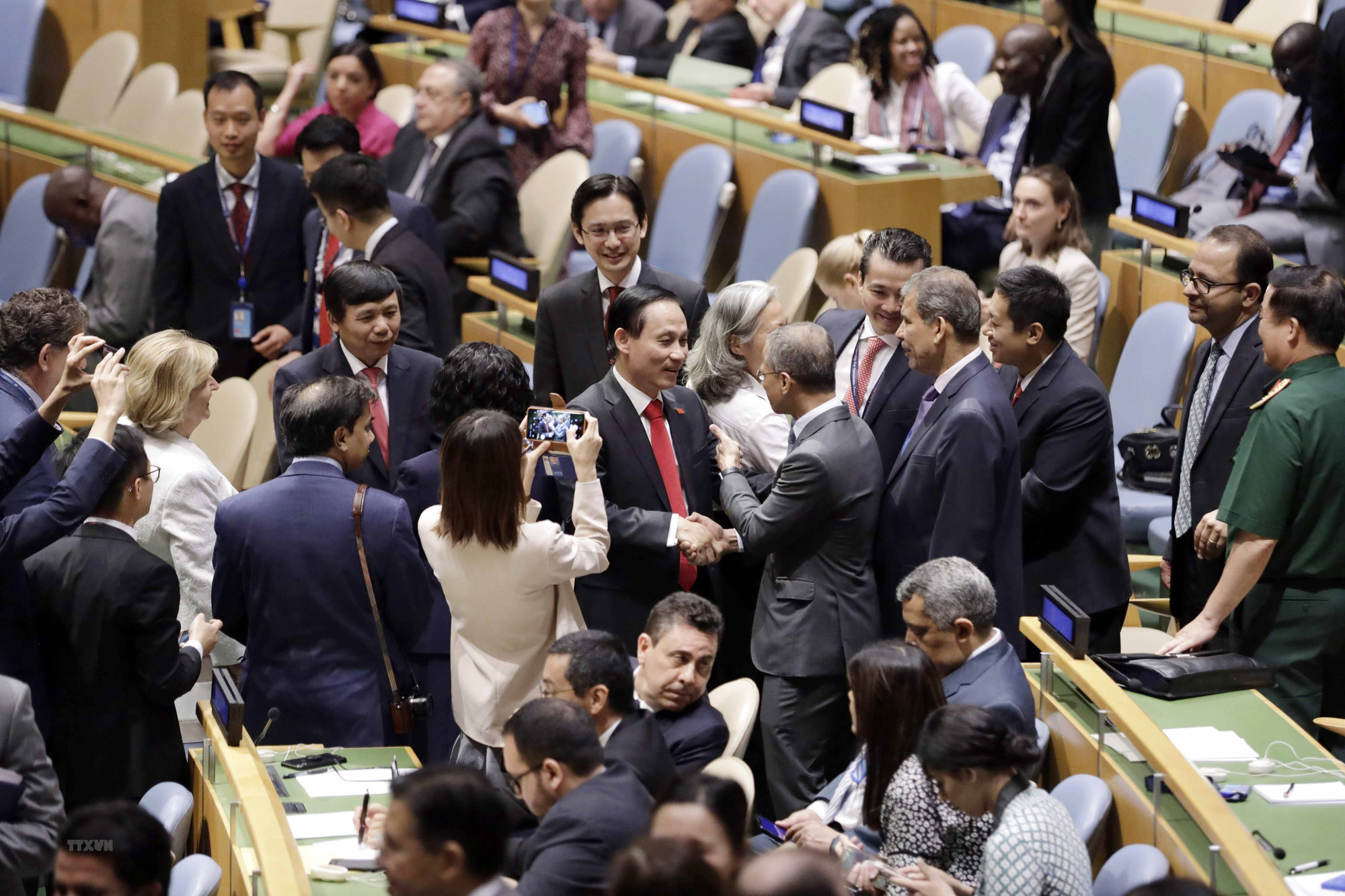 |
| Deputy Foreign Minister Le Hoai Trung (centre), head of Vietnamese delegation, receives congratulations from diplomatic representatives of other countries after Vietnam won the election to become a non-permanent member of the UN Security Council for 2020-2021, New York, US, June 7, 2019. (Photo: THX/VNA) |
Thanks to its contributions, Vietnam has been trusted to be elected to many important positions and agencies of the UN, such as non-permanent member of the UN Security Council for 2020-2021 term, member of Board of Governors of the International Atomic Energy Agency (IAEA) for the 2021-2023 term, member of the Postal Operations Council (POC) of the Universal Postal Union (UPU) for the 2022-2025 term, and Vice President of UN General Assembly's 77th session (September 2022 – 2023). Vietnam is now a member of three important UNESCO mechanisms: the Executive Board in the 2021-2025 tenure, the Inter-Governmental Committee for the Protection and Promotion of the Diversity of Cultural Expressions in the 2021-2025 tenure, and the Inter-Governmental Committee for the Safeguarding of Intangible Cultural Heritage in the 2022-2026 tenure. It was also elected to the International Law Commission (ILC) for the 2023-2027 tenure, UN Human Rights Council (UNHRC) in the 2023-2025 tenure, and the Legal and Technical Commission (LTC) for the 2023-2027 term.
During his visit to Vietnam in October 2022 on the occasion of the 45th anniversary of the country’s membership in the UN, UN Secretary-General António Guterres appreciated Vietnam's great efforts in overcoming post-war difficulties and achieving significant achievements, especially in promoting equality and inclusive development.
Vietnam has participated positively in a wide range of activities, from sharing development experiences to supporting the UN's Peacekeeping Operations, acting as an ambassador of peace, and always striving for unity.
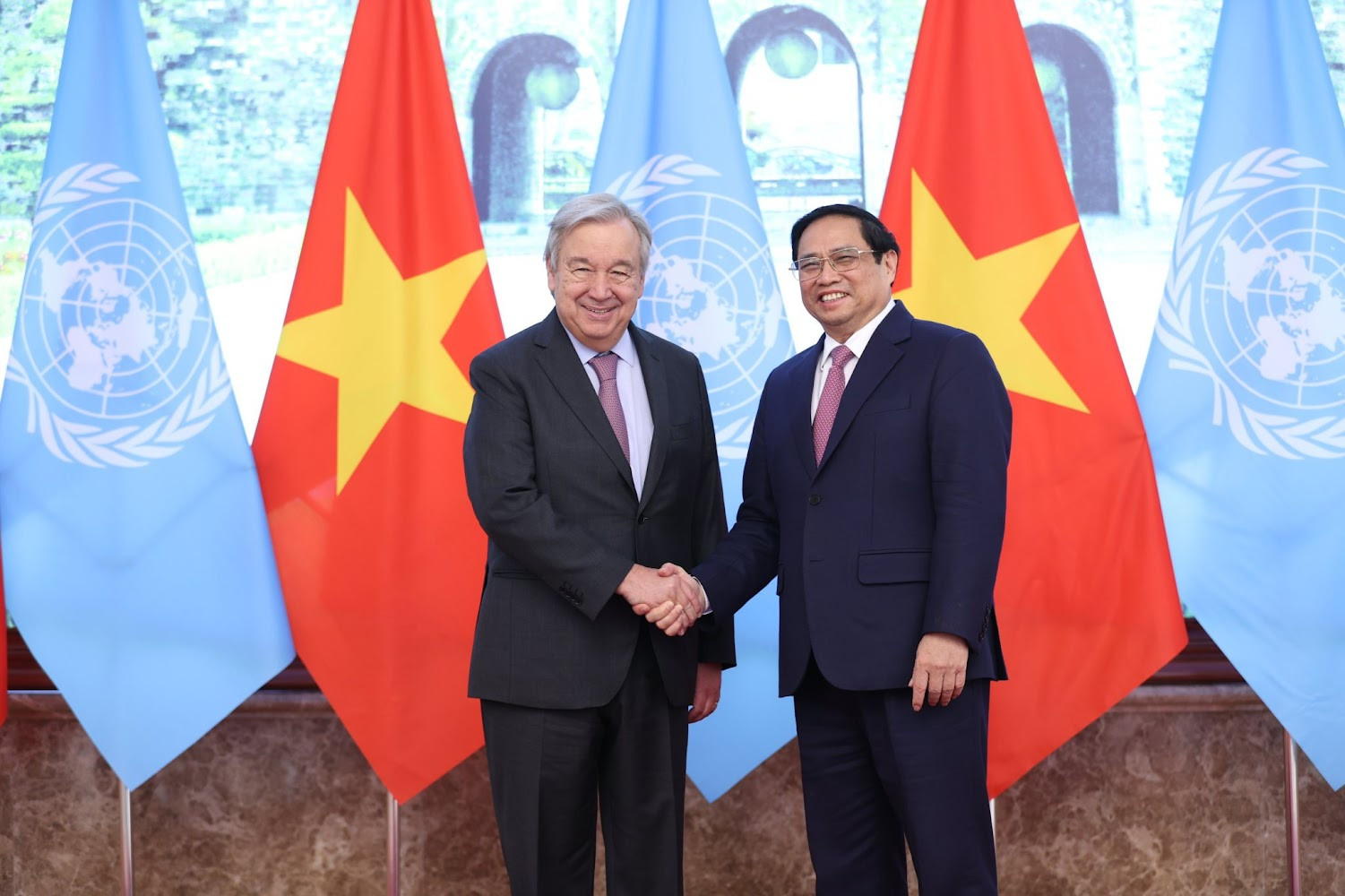 |
| Prime Minister Pham Minh Chinh hosts a reception at the Government headquarters on October 22, 2022, for UN Secretary General António Guterres, who is on his visit to Vietnam on the occasion of the 45th anniversary of the country’s membership in the UN. (Photo: VGP) |
Vietnam always affirms its consistent stance on issues of peace protection, sustainable development, promotion of the UN Charter and international law, especially the most fundamental principles. Vietnam has also actively cooperated with the UN and international partners to address non-traditional security challenges.
United Nations Secretary General António Guterres shared his hope that Vietnam will continue to actively contribute to the implementation of the common goals of the international community.
Vietnam has conducted many positive and diverse activities, from sharing development experiences and contributing to peacekeeping activities of the UN, becoming a messenger of peace and a country always striving for unity.
United Nations Secretary General António Guterres
United Nations Resident Coordinator in Vietnam, Pauline Tamesis said that since joining the United Nations in September 1977, Vietnam has transformed from a country dependent on United Nations support to a country that strongly contributes to the regional and global agenda, demonstrating its role as an increasingly active member of the international community, including contributions to peacekeeping missions and the United Nations Women, Peace and Security Agenda.
Over the past 45 years, from the period of post-war national reconstruction to the era of breaking the embargo and increasingly international integration, cooperation between Vietnam and the United Nations has been of great significance, resulting in positive effects while meeting Vietnam’s requirements and interests in each period, and contributing to strengthening the role and voice of Vietnam at the United Nations.
These results will create favourable conditions for the joint efforts of Vietnam and the United Nations in overcoming existing problems, improving the effectiveness of bilateral cooperation, and supporting Vietnam’s national development and international integration as well as enhancing the role of the United Nations in the new era.
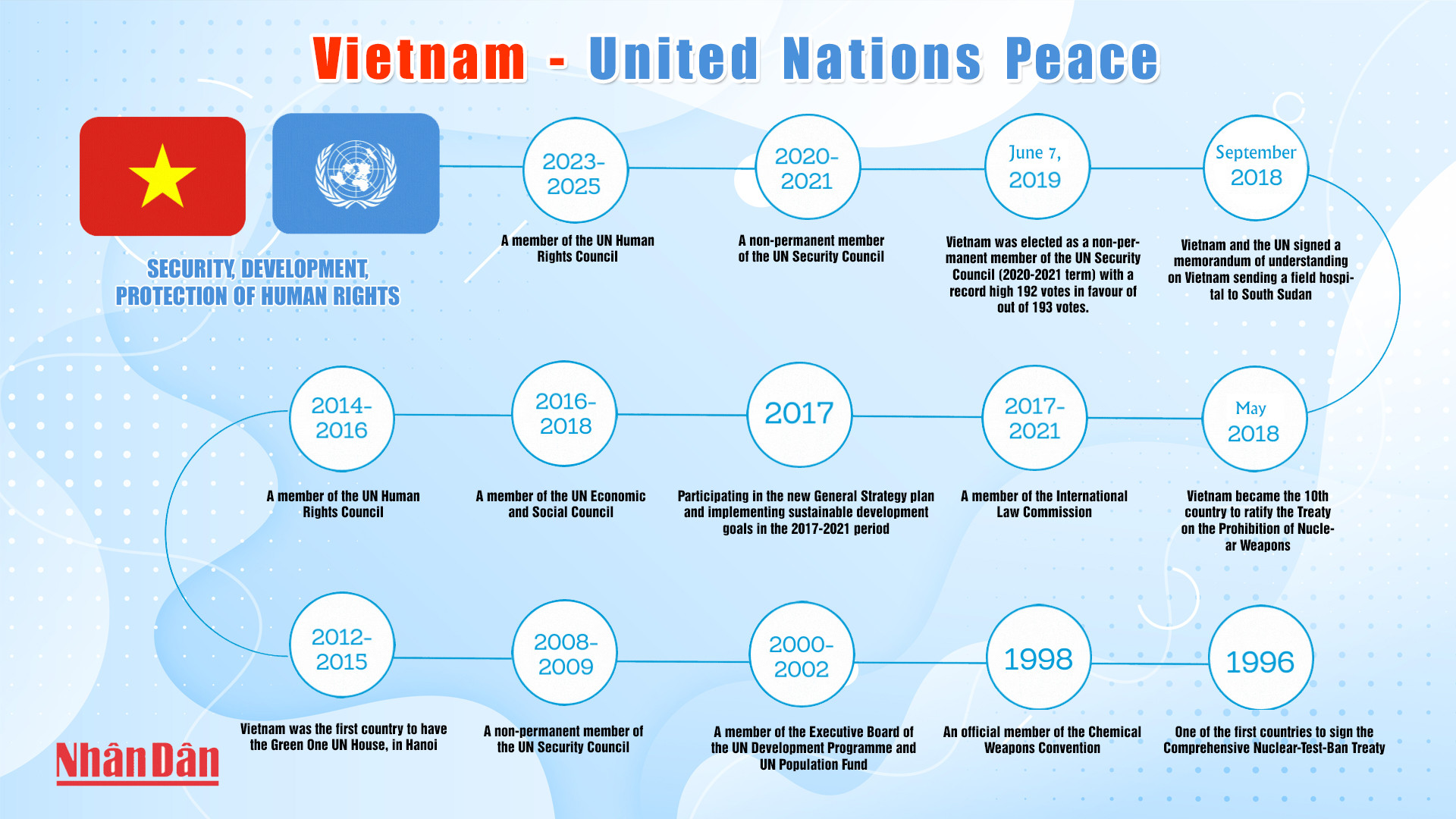 |
| Infographic: Vietnam – United Nations Peace - Security, development, protection of human rights |
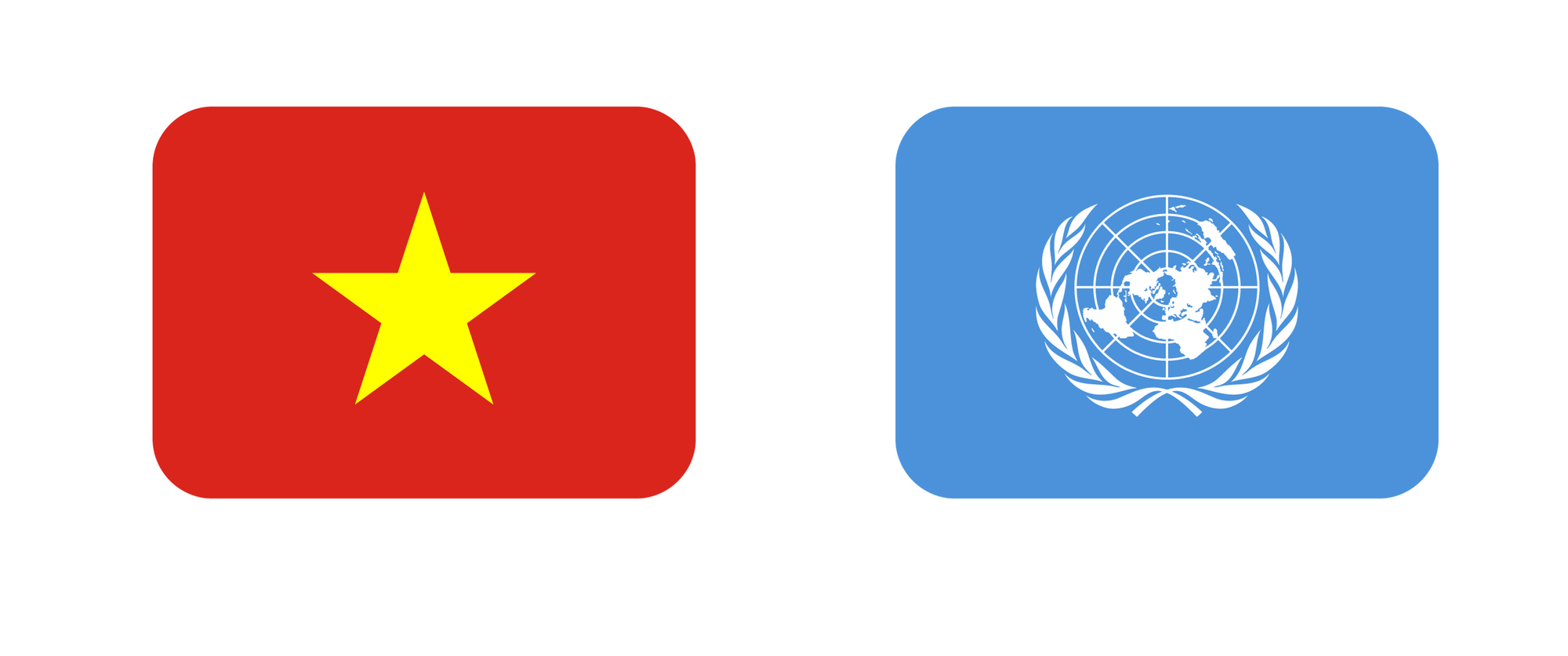 |
Content: TRUNG HƯNG
Sources: Ministry of Foreign Affairs, Nhan Dan Newspaper, VGP, VNA
